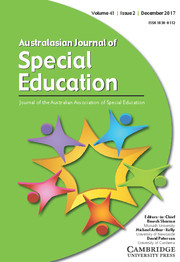Article contents
Teacher Perceptions of Factors for Successful Inclusive Early Childhood Education in Hong Kong
Published online by Cambridge University Press: 25 March 2015
Abstract
In this study the authors aimed to examine the differentiability of 5 factors that preschool teachers may perceive as essential for successful implementation of inclusive education in regular classrooms. The 5 hypothetically influential factors were teamwork, curriculum, school support, government support, and stakeholders’ attitudes. Teachers from half-day kindergarten and full-day childcare centre settings in Hong Kong with varying teaching experience were surveyed (N = 461). Confirmatory factor analysis defined the 5 distinct factors, all of which displayed high scores (Ms > 4 on a 5-point scale). A 2 (experience: low; high) x 2 (school type: half-day kindergarten; full-day childcare centre settings) multivariate analysis of variance (MANOVA) found some subtle group differences. Less experienced teachers found stakeholders’ attitudes to be important, and more so than more experienced teachers, whereas full-day childcare centre teachers found teamwork, curriculum, and stakeholders’ attitudes more important than did half-day kindergarten teachers. The findings imply that whereas all 5 factors are perceived by teachers as important for the success of inclusive education, some factors are of greater concern to teachers working in full-day childcare centres than teachers working in half-day kindergartens. The findings provide advice on how best to allocate limited resources across settings with the intention of promoting inclusive education.
Keywords
- Type
- Original Articles
- Information
- Copyright
- Copyright © The Author(s) 2015
References
- 3
- Cited by


